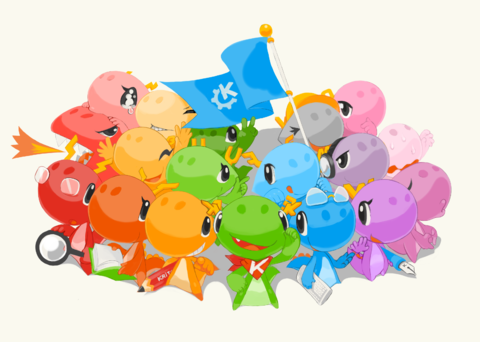Main Page

Welcome to the KDE Community Wiki! KDE is a world-wide community of software engineers, artists, writers, translators, and creators who are committed to the development and distribution of Free Software. If that sounds like you, you're in the right place!
This is the working area for community members and contributors. It contains information about collaboration on projects and goals.
This wiki contains guides for getting involved with the community, making a living contributing to KDE, setting up a development environment for building KDE software, reporting bugs, translating software, and getting in touch with different KDE projects and teams.
If you're interested in how to use KDE Frameworks and libraries in your own software, take a peek at the KDE Developer Platform for guides and tutorials.
Community Information Hub
Get started learning about and contributing to KDE with some basic information found at these links:
- Welcome to KDE
- Basic information about KDE.
- Current Goals
- KDE's goals to focus on as a community
- Get Involved
- Hub for learning how to contribute. Here you can find resources about software development, translation, visual design, management, bug triaging, and more.
- Policies
- Policies concerning development of KDE software and community standards in general. Related: Guidelines and How-tos
- Schedules
- Upcoming freezes and release dates for KDE's main products.
- Infrastructure
- Infrastructure provided for KDE projects such as source control and systems for translators.
- Guidelines and How-tos
- Guidelines for creating good software and helpful information for contributors that isn't project-specific.
- Keynotes and Presentations
- Keynotes and presentations given by the KDE community.
- Make a living contributing to KDE
- How to make a living contributing to KDE.
Community Management and Coordination
These teams help keep the KDE community running smoothly by providing support, administration, and arbitration:
- Community Working Group
- Helping community members work together
- KDE e.V.
- Financial and legal administration.
- Incubator
- Process for adding existing projects to the KDE family.
- Mentoring
- Programs for introducing new contributors to KDE. Related: Administration of the mentoring programs
- The KDE Network
- Representatives of the community who promote KDE globally.
- Promo
- Getting the word out about KDE.
- Sysadmin
- Building and maintaining KDE infrastructure.
Cross-Project Teams
These teams work on areas common across lots of projects, sharing their expertise and working on tasks that individual projects often don't have the resources to manage on their own.
- Accessibility
- Bug Triaging
- Documentation
- Gardening
- Localization
- Research
- Platform teams
- Visual Design Group
Projects
These are pages for specific KDE projects. Not every project or app has a page here; these are simply the ones that contributors found useful for information storage purposes. For a full list of KDE apps, see https://kde.org/apps.
- Alkimia
- Baloo — Metadata and search
- Commit Digest
- Common Task Videos
- Calligra — Office and creative suite
- digiKam
- Dolphin
- Gwenview
- ISOImageWriter
- KDE Utils
- KGet
- KIO GDrive
- Kopete
- Multimedia
- LatteDock
- Rekonq
- Solid — KDE hardware teams
- Sonnet — Spell checking extraordinaire
- Playground — Projects that are not ready but still in discussion
- KDE Core — Core modules of KDE, including kdelibs
- KDE Edu
- KDE Frameworks 5
- KDE Games
- KDE PIM
- KDE Science
- KDevelop
- Krita — Painting for Digital Artists
- KWin
- Necessitas
- Neon
- Ocs-server
- Plasma Project Team Coordination
- Real-Time Communication and Collaboration (Telepathy)
- RKWard GUI for R
- Zanshin
- Akademy Tools — Digital Tooling for Planning and Organizing the KDE Annual World Summit
Subcommunities
These are groups that come together based on shared experiences rather than because they are working on the same thing.

